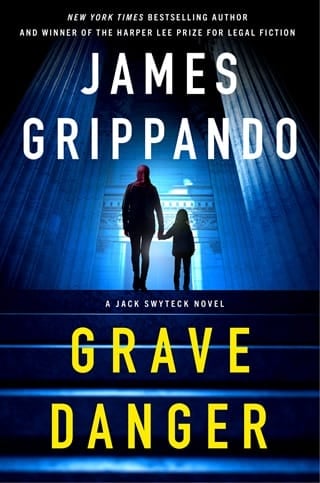Chapter 15
Wednesday night was bingo night at the Palace skilled nursing facility. Jack’s abuela said he brought her good luck, so he tried to go as often as he could. This time he brought Righley with him. Laying eyes
on her great-granddaughter always put a smile on Abuela’s face.
“Ay, mi vida,” said Abuela as Jack and Righley entered her room. My life . It was her way of expressing how important family was to her.
Abuela had been born in Bejucal, a small town near Havana, a city best known to Americans as the birthplace of Hollywood star Andy
Garcia. Her only daughter—Jack’s mother—fled Castro’s Cuba with only her mother’s blessing and the shared hope that her mother
would be among the next wave of asylum seekers to land in Miami. It took decades. Jack’s mother was long dead, having fallen
to eclampsia after giving birth to Jack, and Jack was a grown man when Abuela finally made it. By then, the damage was done. Jack could barely speak a word of Spanish, had never eaten an empanada in his
life, and wouldn’t have known the smell of a good cigar from a smoldering rope. Upon her first visit to her daughter’s grave,
Abuela committed herself to giving her gringo grandson a crash course in all things Cuban. He topped out at about a C-minus.
“She talks funny,” Righley whispered into Jack’s ear. She was no stranger to her great-grandmother’s Spanish, but lately she’d
become somewhat of a linguistic critic. Her third-grade Spanish teacher was Castilian. Cuban Spanish was to Castilians as
a Brooklyn accent was to British royalty.
“Be sweet,” said Jack.
Abuela called for the nurse and insisted on a change of clothes before bingo. She looked just fine, and she would miss the start of bingo, but there was no changing her mind. With each passing month Jack found her a little more stubborn and difficult to reason with. Her memory was fading too. She was having trouble with the timeline of her important life events. When she got married. When her daughter was born. When her husband died. Like many Cuban immigrants in their eighties and nineties, she recalled things, if at all, as either “before Castro” or “after Castro.”
“We’ll wait in the lobby,” Jack told the nurse.
Jack and Righley walked hand-in-hand down the hallway. He was impressed that she’d remembered that it wasn’t polite to look
inside the rooms, even if the door was wide open.
“She’s your mommy’s mother, right?” asked Righley.
“That’s right,” said Jack.
“How old was your mommy?”
“You mean when she died?”
“No, I’m asking how old she was when she was born,” Righley said with sarcasm. “Duh.”
Righley was unquestionably her mother’s daughter. “She died when I was very young. A baby.”
“Not you. How old was she?”
It made Jack sad to say it. “She was twenty-three.”
“How old is Abuela?”
“Eighty-nine.”
Righley stopped cold in the hallway. “That’s so unfair. Why did your mommy die so young, and her mother is still alive?”
Jack took a knee and looked her straight in the eye. “I can’t answer that, honey. I don’t think anyone can.”
“Mommy says that’s what your new trial is about. A mother who died too young.”
“Your mother told you that?”
“Mm-hmm.”
“When did the two of you talk about my case?”
“We saw you on the news. I asked, and she told me it’s about a mommy who died young and her daughter who misses her. That’s
why it’s so important to you, and why you’ve been working so late every night.”
Jack found it interesting that Andie thought the case was more about Ava and Yasmin than Zahra and Yasmin. “That’s really what Mommy said?”
Righley covered her mouth. “Oh. Was I not supposed to tell you that?”
“It’s okay. I’m glad you told me.”
“Is Mommy right?”
Even though it hadn’t occurred to Jack that this case might be personal to him, he couldn’t say Andie was wrong. Maybe that
was what his father had meant, too, when he’d told Jack that the stakes in this civil case were higher than any criminal case
he’d ever handled.
He rose from his knee and took Righley by the hand. “Come on,” he said. “Let’s go save Abuela a seat at the bingo table.”
It was after seven, and Andie was still at the Miami field office, knowing that Jack and Righley were visiting Abuela. Wednesday
was supposed to be “Mom’s night off,” the one evening each week that she didn’t have to cook dinner for the family, help Righley
with her homework, make her lunch for the next school day, and get her ready for bed.
Somehow, Mommy’s night off had turned into Mommy’s night to work late at the office. Seven was the soonest the division chiefs
from the State Department’s Office of Children’s Issues could videoconference with her. She was alone in her office, and their
images were on her desktop LCD screen: Chief Comstock, overseeing Europe, and Chief Davis, covering the Eastern Hemisphere.
“I’m sorry,” said Comstock. “The State Department can neither confirm nor deny what you’ve told us, Agent Henning.”
Andie had laid out in detail the visit from the woman who had taxied to Key Biscayne and told her that the US government was
negotiating with the Iranians for her husband’s release from a political prison.
“Let’s break this down a little,” said Andie. “When this woman told me that the United States and the Iranian regime are currently
engaged in sensitive negotiations, that was true, correct?”
“Chief Davis and I told you that much in our last meeting,” said Comstock. “We are in active negotiations of some form.”
“And she was also in sync with the State Department when she told me that Jack is putting those negotiations at risk by resurrecting
the sensitive issue of whether or not Ava Bazzi was murdered by the Tehran morality police.”
“Yes. We are in sync,” said Comstock.
“And you’re not denying that those negotiations are being led by the National Security Council, not the State Department—because
the NSC is negotiating for the release of her husband.”
“We are neither confirming nor denying.”
“What if I told you that, if you do confirm, I might be willing to help you.”
“Speaking to you in your capacity as a federal agent, I find that statement troubling,” said Comstock.
“I agree,” said Davis.
“Troubling? How?”
“As a federal agent, it’s your duty and responsibility to convince your husband to back away from the Ava Bazzi controversy,”
said Comstock.
“I’m also a wife. The State Department is asking me to ignore the fact that I’m married to Jack Swyteck. You’re essentially
asking me to do undercover work inside my own marriage.”
Chief Comstock paused, then said, “That’s a fair characterization of our request. What’s your answer, Agent Henning?”
Andie hadn’t expected such a straight answer. “My answer is that I would need to lay out some ground rules.”
“Such as?”
“Before I would even consider such an assignment, I would need to know that someone’s life is at stake. In other words, I
certainly would not provide any assistance to the State Department vis-à-vis Jack if the only thing at stake is some nebulous
and ultimately meaningless matter of international diplomacy that the president and his administration would tout in the short
term as a political feather in their cap.”
“The State Department does not negotiate for reasons of political expedience,” said Comstock.
“My point is that I won’t help you for anything less than a matter of life and death. I want to see with my own eyes and hear
with my own ears, firsthand, that the hostage negotiations this woman described to me are real.”
“We can’t do that,” said Comstock. “We can’t make you privy to the negotiations.”
“Then we don’t have a deal,” said Andie.
Davis, whose division included Iran, spoke up. “Let’s try a slightly different approach. What if we showed you proof—actual
evidence—that Jack’s argument in court is completely wrongheaded?”
“Are you saying that the State Department has proof that the Iranian morality police did not murder Ava Bazzi?”
“Yes,” said Davis. “And we will show you that proof in your capacity as a federal agent. All we are asking you to do is tell
your husband the truth. Tell him that you have seen a classified dossier confirming that Ava Bazzi was not murdered by the
morality police.”
Andie was naturally skeptical. “Why don’t you just tell Jack yourself?”
“That should be obvious, Agent Henning.”
“Indulge me,” said Andie.
“If we share the contents of a confidential dossier with your husband, he would be free to share that information with the
court, the press, or anyone he desired. It’s not a crime for your husband to disclose confidential information that the State
Department voluntarily shares with him.”
“But the same thing applies if I tell him there’s a confidential State Department dossier showing that Ava Bazzi is still alive.”
“It’s a little different,” said Davis.
“How is it different?”
“If Jack Swyteck publicly reveals that his wife told him about a confidential dossier about Ava Bazzi, you would go to prison.”
Andie understood the implicit threat: if Jack were to go public with anything Andie told him about the dossier, the State Department would flatly deny ever having authorized her, much less directed her, to disclose the contents of the classified dossier to her husband. But that was not her chief concern.
“Let me make sure I understand,” says Andie. “You’re asking me to share classified information with my husband to get him
to completely reverse his position on Ava Bazzi. Is that right?”
“Yes.”
“And you expect me to bet that Jack would say nothing about the reason for his about-face? He’d offer no explanation to his
client, to the judge, or to the media—solely to keep me from going to prison for revealing a confidential dossier?”
Her question seemed to surprise both division chiefs. Comstock spoke this time. “Is that not a safe bet?” she asked Andie.
Andie wanted to say that was a safe bet. That Jack would put her above his duty to his client. But in light of all that was
happening between them, she honestly didn’t know the answer—which troubled her in ways that she couldn’t possibly share with
the State Department.
“As safe as it would be in any marriage, I suppose,” she said.
“Good,” said Comstock. “Because these negotiations are as sensitive as they come. They are truly a matter of life and death.”
A matter of life and death . Their use of her own words was as close to confirmation as she would get. The division chiefs would never admit explicitly
that the life of an imprisoned American was hanging in the balance, but all signs indicated that the woman who visited her
had been for real, that her husband was on the verge of a negotiated release or perhaps even a prisoner swap, and that Jack
was putting those negotiations in jeopardy by reopening the issue of Ava Bazzi and taking the position that Ava was murdered
by the morality police.
“Okay,” Andie said. “Show me the proof.”
 Fullepub
Fullepub 



